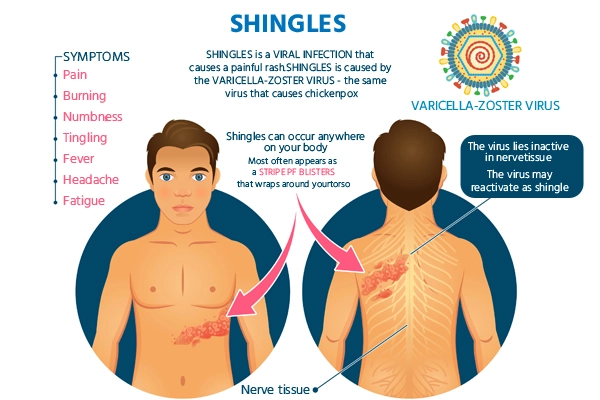Herpes Zoster: Overview
Herpes Zoster, also known as Shingles, is a virus that causes a severe rash or blisters on the skin. It is caused by the varicella-zoster virus, which is also responsible for chickenpox. The rash usually manifests itself as a ring of rashes or boils in one area of the body.
When you experience chickenpox as a child, your body fights against the varicella-zoster virus and the physical ailments diminish, but the infection stays in your body. Sometimes the virus reactivates in maturity. The varicella-zoster infection makes its second start in the form of shingles this time.
Herpes is not a life-threatening disease, but it can be excruciatingly painful. Vaccines can help minimize the chances of getting shingles. Early treatment can help to minimize the duration of herpes infection and reduce the likelihood of complications. Postherpetic neuralgia is the most prevalent risk factor, which continues shingles discomfort even after the blisters have healed.
The majority of herpes cases resolve within 3 to 5 weeks. The illness can occur more than once in the same person, particularly if they have health risks, but this is rare. Let us have a look at the stages, symptoms, causes, diagnosis and treatment for Herpes Zoster.
Stages of Herpes Zoster
-
Stage 1: Herpes usually appears on one side of the body, most commonly on the waist, back, or chest.
-
Stage 2: A red rash in that location may appear within 5 days.A few days later, small groups of seeping, fluid-filled blisters may form in the same place.
-
Stage 3: Flu-like symptoms such as fever, headache, and exhaustion are possible.
Herpes Zoster symptoms
Herpes symptoms often affect only a small portion of one side of the body. The most common herpes symptom is pain. This can be intense for some people.
Among these indications and symptoms are:
- Pain, burning, numbness, or tingling are all possible symptoms
- Touch sensitivity
- A red rash that occurs few days after the pain has gone away
- Blisters that rupture and crust over with fluid
- Itching
Some people also report:
- Fever
- Headache
- Light sensitivity
- Fatigue
Causes of Herpes Zoster
The varicella-zoster virus, which also causes chickenpox, causes herpes. If you've previously had chickenpox, the virus can reactivate and produce herpes.
It is unknown why some people develop herpes while others do not. It is more prevalent in elderly persons because of decreased immunity to pathogens.
It may eventually reactivate and migrate across the neural pathway to your skin, resulting in herpes. However, not every person who gets chickenpox gets herpes.
The cause of shingles is unknown. However, as you become older, your protection against illnesses may weaken. Herpes is more common in elderly adults and those with compromised immune systems.
Risk factors of Herpes Zoster
Herpes can affect everyone who's had chickenpox. Apart from this other factors also increase the risk of having this disease.
The following factors can increase your chance of developing shingles:
-
Being over the age of 50: Herpes is more common in adults over the age of 50. The danger grows with age.
-
Having specific diseases: HIV/AIDS and cancer, both of which impair your immune system, can increase your risk of herpes.
-
Cancer patients undergoing treatment: Radiation or chemotherapy might weaken your immune system and cause herpes.
-
Taking specific medications: Drugs used to prevent transplanted organ rejection, as well as extended usage of steroids such as prednisone, can raise your risk of herpes.
Herpes Zoster diagnosis
The background and physical findings are used to make a diagnosis. In most situations, laboratory testing to confirm the diagnosis is useless. However, in certain patient populations, notably immunocompromised patients, the appearance can be unexpected and may necessitate extra testing.
Below laboratory tests can be suggested:
- Testing for direct fluorescent antibodies (DFA) in vesicle fluid or a cornea lesion
- Examination of vesicular fluid, a cornea lesion, or blood using polymerase chain reaction (PCR)
- Tzanck vesicular fluid smear (lower sensitivity and specificity than DFA or PCR)
Herpes can be identified by the pattern of the rash on your body. Herpes blisters typically form in a ring on one side of the body. Herpes can also be identified in a laboratory utilizing scrapings or a swab of blister fluid.
Treatment for Herpes Zoster
There is no cure for herpes, but treating it as quickly as possible will help you avoid complications and recover faster. Ideally, treatment should begin within 72 hours of the commencement of symptoms. Your doctor may recommend medicine to alleviate symptoms and minimize the duration of the infection.
Antiviral medications such as acyclovir, valacyclovir, and famciclovir, as well as anti-inflammatory medicines such as ibuprofen, can be recommended. The Shingrix vaccine is available from the FDA and is thought to be more than 90% effective.
The brand names are different in different countries and medicines should be taken only after having a verified prescription.

